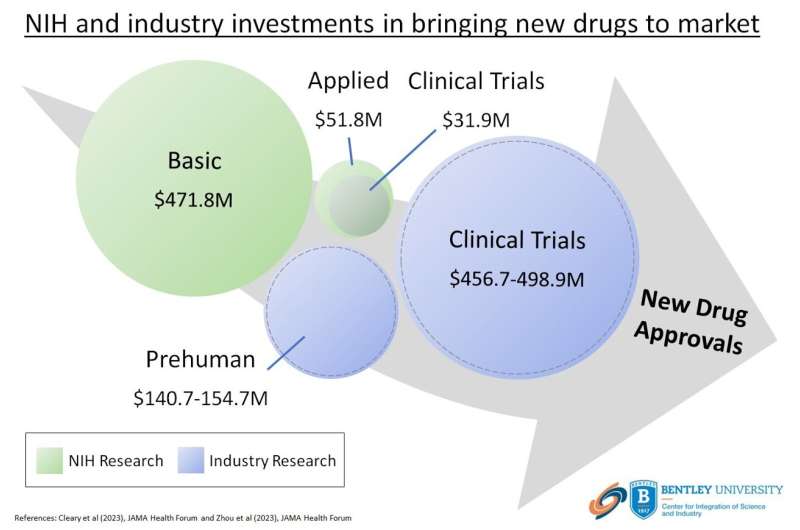This article has been reviewed according to Science X's editorial process and policies. Editors have highlighted the following attributes while ensuring the content's credibility:
fact-checked
peer-reviewed publication
trusted source
proofread
Study assesses NIH contribution to clinical development of new drugs

The U.S. National Institutes of Health (NIH) contributed $8.1 billion in project funding for phased clinical trials involving drugs approved by the FDA from 2010–2019, according to a new study from Bentley University's Center for Integration of Science and Industry.
The study, published in JAMA Health Forum, shows that NIH funding for clinical trials represents <3.5% of total NIH spending for basic or applied research related to these products and was significantly less than reported industry spending on clinical development.
The article, titled "Spending on phased clinical development of approved drugs by the US National Institutes of Health compared with industry" is the first to broadly assess the NIH contribution to clinical development of new drugs and compare the scale of NIH spending relative to reported spending by industry.
The study shows that NIH funding represented only ~10% of reported industry costs for phased clinical trials and was largely limited to programs designed to advance clinical and translational science in general by supporting centers, core capabilities, and training.
"This analysis confirms previous studies showing that the NIH makes substantive investments in the basic and applied science underlying new drugs, but also demonstrates that the NIH makes only limited contributions to development," said Fred Ledley, Director of the Center for Integration of Science and Industry, and the senior author on this study. "This is consistent with policies that position the public sector as an early investor in pharmaceutical innovations that are subsequently developed and commercialized by the pharmaceutical industry."
This study identified $247 billion in total NIH funding contributing to more than 2.5 million publications describing basic or applied research related to 386 of 387 drugs approved 2010-2019 with $8.1 billion (3.3%) related to phased clinical development. This funding contributed to >12 thousand publications describing phased clinical trials involving 240 of 387 (62%) approved drugs. Average NIH spending was $33.8 million per approved drug and was significantly lower than reported industry spending.
Overall, NIH spending represented ~10% of reported industry spending including ~25% of phase 1 costs, ~22% of phase 2 costs, and ~4% of phase 3 costs. More than 90% of NIH funding came through mechanisms designed to advance the practice of translational science or support programs or centers that provide clinical research capabilities, patient networks or consortia, or training in clinical, translational, or regulatory science (including Clinical Translational Science Awards). Only 3.3% of the total NIH funding was provided through mechanisms that support investigator-initiated research.
Dr. Edward Zhou was the lead author of this work along with Dr. Matthew Jackson and Dr. Ledley.
More information: Spending on Phased Clinical Development of Approved Drugs by the US National Institutes of Health Compared with Industry, JAMA Health Forum (2023). DOI: 10.1001/jamahealthforum.2023.1921 , jamanetwork.com/journals/jama- … ealthforum.2023.1921




















